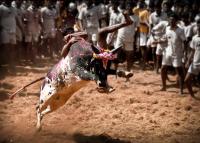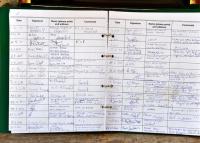AK Sikri
 The Supreme Court bench comprising the Chief Justice TS Thakur, and Justices AK Sikri and R Banumathi, is set to hear as many as five writ petitions challenging the validity of the notification issued by the Union Ministry of Environment, Forests and Climate Change on 7 January permitting the holding of jallikattu and other related festivals involving the performance of bulls in religious festivals, despite the Supreme Court’s 2014 judgment holding it illegal.
The Supreme Court bench comprising the Chief Justice TS Thakur, and Justices AK Sikri and R Banumathi, is set to hear as many as five writ petitions challenging the validity of the notification issued by the Union Ministry of Environment, Forests and Climate Change on 7 January permitting the holding of jallikattu and other related festivals involving the performance of bulls in religious festivals, despite the Supreme Court’s 2014 judgment holding it illegal.
 Two very important cases related to the power to appoint teachers and rules on when special leave petitions (SLPs) should be entertained, are scheduled to be heard by two Supreme Court’s constitution benches today under CJI TS Thakur’s new constitution bench schedules.
Two very important cases related to the power to appoint teachers and rules on when special leave petitions (SLPs) should be entertained, are scheduled to be heard by two Supreme Court’s constitution benches today under CJI TS Thakur’s new constitution bench schedules.
 New Chief Justice of India (CJI) TS Thakur told it like it is, in a speech at a function hosted by the Bar Council of India (BCI).
New Chief Justice of India (CJI) TS Thakur told it like it is, in a speech at a function hosted by the Bar Council of India (BCI).
The Supreme Court on Monday was unimpressed with the functioning of the national carrier Air India, which is running into losses while other private airlines are prospering, demanding to know the reason why, reported The Economic Times.
A bench of Chief Justice of India TS Thakur, Justice AK Sikri and Justice R Banumathi asked: “While private airlines are prospering, Air India is going into red. Who should be held responsible for Air India mess? There are so many stories going around.”
They were hearing a public interest litigation asking the carrier to commence flights connecting Delhi and Shimla. The Himachal Pradesh high court had on 7 December 2015 asked the carrier to commence that flight route on a trial basis, which was put on hold by the Supreme Court.
Solicitor General Ranjit Kumar, representing Air India, told the court that the flight connecting the two cities was not economical as there were 12 to 15 one-way passengers only, and that Shimla airport did not have refuelling facilities to which the court reportedly reprimanded the government with: “You have already constructed an airport, probably spending Rs 100 crores, now you can’t say that there is no refuelling facilities.”
The court issued notice to the civil aviation ministry, the Airports Authority of India, the Directorate General of Civil Aviation, and the Himachal Pradesh government as well as the petitioner Paras Daulta.
The matter will come up for hearing next on 16 February.
Chief Justice of India (CJI) TS Thakur and Supreme Court Justice AK Sikri are carpooling, reported The Indian Express:
The two also finalised their travel itinerary for the next 15 days when the odd-even scheme would be in effect in the capital.
The two decided to lead by example and carpool, despite being exempt from the policy as they hold constitutional posts. Justice Thakur has an odd-numbered car, while Justice Sikri’s vehicle is even. The two live close to each other.On Monday - the first working day in the top court after winter break - Justice Sikri picked up the CJI on his way to court.
Supreme Court bench led by Chief Justice of India TS Thakur declined to entertain a public interest litigation demanding bringing of a uniform civil code in the country on Monday telling the petitioner that the power to do so remains with parliament and not the judiciary, reported The Times of India.
The petitioner Ashwini Upadhayay was represented by four senior advocates including Gopal Subramanium and Mohan Parasaran who relied on Directive Principles in the Constitution as well as case laws where the Supreme Court has insisted on introduction of the Uniform Civil Code.
The bench of TS Thakur and Justices AK Sikri and R Banumathi were unmoved by petitioner and said that heavy costs would be imposed on him if he continued with the petition. The bench said: “Sarla Mudgal case is the best that you can refer to in support of the PIL Article 44 is a constitutional goal. Are courts equipped and empowered to enforce constitutional goals? It reflects the hopes of Constitution makers. But hopes will remain in the realm of hope unless Parliament decides to convert them into enforceable rights.”
“The Supreme Court has consistently declined to go into it. The moot question is can Supreme Court convert a Directive Principle into fundamental right? It is for Parliament to take a call on it. What cannot be done directly, cannot be done indirectly through the courts.”
The bench however provided hope to Muslim women and observed that if and when a Muslim woman comes to the court and challenges triple talaq, it would be examined by the court and also said that no woman from a Muslim community has questioned the practice of triple talaq till now.
The petition was withdrawn by the petitioner’s advocate.
In a huge setback to corporate honcho Anshuman S Ruia and Ravi S Ruia and their company Essar Teleholding, the Supreme Court today upheld their trial by the Special CBI court trying 2G scam cases, rejecting their plea that they should instead be tried by a magisterial court.
SCOI Report: Finally, ex-CBI director Ranjit Sinha mysterious visitors diary to be probed in 2G case
 A Supreme Court bench comprising of justices Madan B Lokur, Kurian Joseph and AK Sikri finally gave the go-ahead today (14 September), to the inquiry team led by former CBI special director ML Sharma to probe the visitors’ diary of former CBI chief Ranjit Sinha.
A Supreme Court bench comprising of justices Madan B Lokur, Kurian Joseph and AK Sikri finally gave the go-ahead today (14 September), to the inquiry team led by former CBI special director ML Sharma to probe the visitors’ diary of former CBI chief Ranjit Sinha.
NLU Delhi’s nine-month-old death penalty clinic helped death penalty convicts Shabnam and Saleem win relief in the Supreme Court, which quashed their death warrants on Wednesday after having stayed their execution earlier in the week.
The clinic, according to its press release, coordinated the legal representation for Shabnam and Saleem who in 2008 had, together as lovers, murdered Shabnam’s family and were sentenced to death in 2010 by a sessions judge in Amrohi. Their death penalty was later confirmed by the Supreme Court and six days after the confirmation their death warrants were handed down. They had filed criminal appeals before the Supreme Court which dismissed these appeals on 15 May 2015.
Senior advocates Raju Ramachandran and Anand Grover, representing the petitioners in Shabnam v. Union of India & Anr and National Law University, Delhi through Death Penalty Litigation Clinic v. Union of India & Anr, challenged the hasty award of death warrants and, according to the release, “emphasised the importance of adhering to constitutionally compatible procedures when decisions with an irreversible impact on an individual’s life are taken by the State”.
The death warrants were issued before Shabnam and Saleem could file review petitions or curative petitions, for which the law gives them 30 days, reported the Indian Express.
Justices AK Sikri and UU Lalit held that the death warrants were awarded in “undue haste and were unwarranted” and “ignored the legal and constitutional options (open court review petitions and mercy petitions before the Governor of Uttar Pradesh and the President of India) available to [Shabnam and Saleem]”.
The Supreme Court, through this judgment, has laid down a clear procedure for issuing death warrants which can only be issued after all legal and constitutional remedies have been exhausted. The court also noted that even when death warrants are sought principles of natural justice and due process of law cannot be ignored.
NLU Delhi’s death penalty clinic is currently working on the legal representation of around 30 prisoners sentences to death.